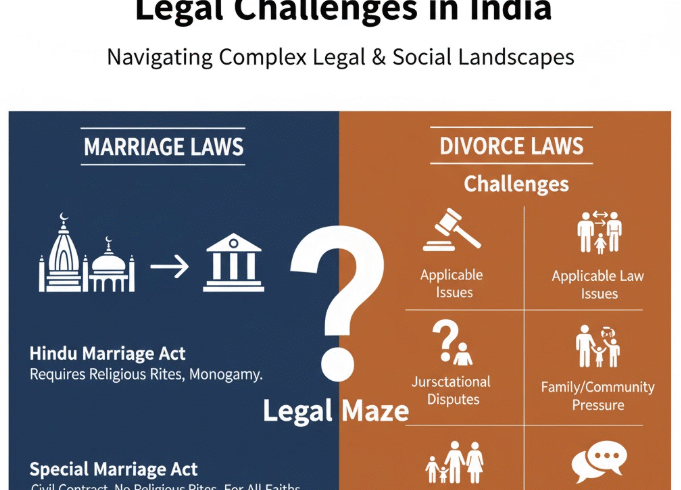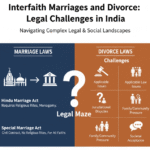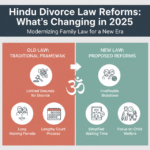Introduction
A divorce can be difficult and emotional for everyone involved. Divorce Laws in India – Only destination where you can get your divorce in India. The government of India has continuously acknowledged the urge to enhance women’s rights keeping pace with gender equality.
Looking ahead to 2024, we need to understand that over time divorce laws in India have moved forward through progressive legislation and judicial activism.
Let us take a look at some of the major reforms that are taking shape and shall change the entire scenario of Divorce laws in India:
Waiving the 6-Month Wait
The Supreme Court, in a ruling delivered by Justices Indira Banerjee and J. K. Maheshwari on December 11, 2021, held that it has the authority to waive off the six-month waiting period for divorce through mutual consent under Hindu law.
In the case of Amit Kumar v. Suman Beniwal, the court held that pursuant to Article 142 of the Constitution, which gives power to Supreme Court to make any order for doing complete justice, it can relax 6 months “cooling off” period on case-to-case basis also.
As per Section 13B of the Hindu Marriage Act, 1955, in a situation where a husband and wife have filed for divorce with mutual consent, they are required to wait for six months from the date when they first file divorce petition. This is a time of waiting for the couple to change their minds. However, the Supreme Court has now explained that it can waive this cooling off period in deserving cases and grant divorce sooner since it is armed with special powers under Article 142 of the Constitution.
RELATED: Cruelty As A Ground Of Decree Of Divorce
JUDGEMENT SUMMARY: Irretrievable Breakdown of Marriage
The Hon’ble Supreme Court in the latest decision delivered on 6th May, 2024 laid down important principles regarding irretrievable breakdown of marriage.
People Also Read: Desertion As A Ground For Divorce In India
Following were the key observations:
a) Prima facie, the Court was not satisfied the case fell within certain guidelines. Senior Counsel was instructed to mediate the dispute and in spite of best efforts made, both the parties were not prepared to agree for any settlement, and there was no chance of their living together. Counsel for the Appellant filed a note listing his endeavors including inter-se discussions of the parties on quantum of permanent alimony to be paid by the Appellant to the Respondent.
b) The Court found based on the uncontroverted evidence that it is a fact that the parties have been separated for 22 years and last lived together in January, 2002. Their children are in college, and they are both gainfully employed. Having regard to all the facts, the Court was satisfied that there are existing just grounds for annulling their marriage as it has irretrievably failed and there is no hope for them to live together any longer. The Court held that it was neither warranted, nor desirable to “force the parties to carry on a formal contract.” It did not express any opinion on the truth of allegations leveled by parties against each other, but in exercise of its powers under Article 142(1) of the Constitution of India, dissolved their marriage by a decree on the basis of irretrievable breakdown.
Live-in Relationship Laws in India
Live-in Relationship laws in India also include maintenance for Live-In-Partners. The last years have seen quite a few landmark judgments passed by the Supreme Court of India pertaining to the legal status of individuals or partners in a live-in relationship.
In the landmark decision of S. Khushboo vs. Kanniammal & Anr. [28 Apr, 2010], the Supreme Court of India ruled that pre-marital sex was not immoral and to be presumed illegal. The court highlighted that cohabitation is a fundamental right protected by Article 21 of the Constitution—that grants every citizen the right to life and personal liberty.
Moreover, even the Supreme Court has recognized women in live-relationships have rights over property. In the matter of Dhannulal and Others v Ganeshram and Another (April 08, 2015), it was declared that a woman has the right to succeed to the property of her deceased live-in partner though not married to him. The court relied on earlier precedents which stated that when a couple has been living together for so long, their relationship should be considered as marriage in the eyes of the law.
This principle was also endorsed in Vidyadhari & Ors. vs. Sukhrana Bai & Ors. (January 22, 2008) where the Supreme Court has ruled that a woman living with a man of her own free will would assume the legal status of a wife even though their marriage is nullified or void after the death of man. Section 125(5) Cr.P.C., therefore, applies to Muslim Women and separate right has been conferred on married daughters.
The above noted path-breaking judgments have taken a giant leap to ensure that the living together relationships are recognized as protected in the legal arena in India, and not to be denied of their rights by keeping the treatment of such couples at par with their married counterparts with regard to few of its aspects like inheritance.
You May Also Read: Divorce Procedure In India
Not A Clandestine Sin Anymore: Adultery Decriminalized
The year 2018 brought a landmark judgment when the Supreme Court of India read adultery out of the penal book, that is the IPC. The five-judge Constitution Bench, headed by former CJI Dipak Misra and comprising current CJI D. Y. Chandrachud along with Justices A.M. Khanwilkar, R.F. Nariman and Indu Malhotra, issued its verdict.
The case titled Joseph Shine v. Union of India was initiated in 2017 when a Kerala-based non-resident Indian moved a Public Interest Litigation (PIL) challenging the constitutional validity of adultery law, section 497 of IPC and section 198(2) of Code of Criminal Procedure (CrPC).
As the law was, having sex with another man’s wife was punishable by up to five years imprisonment. But the wife who allowed it was not liable for prosecution. The law did not extend if a man went in to an unmarried woman or a widow. It is also instructive to note that even a complaint under Section 198(2) of the CrPC could be made only by the aggrieved husband of an adulterous wife.
The highest authority, the Supreme Court ruled that adultery should not be treated as a crime but it is still a valid ground for divorce. The judgment was derived from the concept of gender equality and liberty. Earlier in 2020, a separate five-judge Bench headed by then CJI Sharad A Bobde rejected petitions seeking review of the judgment saying they had no grounds to be heard.
For more information, visit https://zistalegalis.com

Triple Talaq Outlawed
A historic judgment was passed on 22nd August, 2017 by the Supreme Court of India when it declared Triple Talaq (TT) as unconstitutional. Triple Talaq was a contentious practice that granted Muslim men the right to divorce their wives immediately simply by repeating the word “talaq” three times in succession.
The ruling of a five-judge bench was not unanimous; three judges held that the practice indeed violated the fundamental rights of Muslim women, thus rendering it unconstitutional, whereas two judges upheld the constitutionality.
The Supreme Court made it clear that Triple Talaq allowed the husbands to destroy their marriages whimsically and capriciously, without giving any thought as to what might happen with the wives or their rights. This conduct, the court held, violated the fundamental provisions of equality, dignity and individual rights enshrined in the Indian Constitution. By permitting men to end their marriage solely on their own desire, Triple Talaq destroyed the very idea of equality of gender at the same time it ruffled the dignity of Muslim women.
The sentence came to reflect the belief that such a practice belonged in neither the modern, democratic society of equal rights between men and women. The decision came to uphold the dignity and rights of Muslim women, ensuring they are given equal respect as their male counterparts. This was a landmark judgment which made a way for the establishment of gender equality and emancipation of Muslim women in India.
People Also Read: Muslim Marriage Law In India
Source of the Personal Laws Prevail
We saw that Indian law has been categorized as predominantly personal laws which are based mostly on religion and their application can be modified to make them secular. Which implies, a decree of divorce by religious institution such as Christian Church or under personal law is NOT a legal divorce.
Simply put, if a husband and wife (including citizens of other countries) obtain an Indian divorce under the laws of their religion or personal law, it is not valid in terms of Indian law unless and until there is also a Civil Court decree. The order or decree of the Civil Court shall be binding and operates to override any decision of the religious authority or personal law board.
You May Also Read: How To Get A Quick Divorce: Fastest Divorce Process
People Also Read: What is Divorce Mediation
Latest Legislative Amendment: The Marriage Laws (Amendment) Bill, 2013
From the Marriage Laws (Amendment) Bill, 2013
Insertion of new sections 13C, 13D and 13E – Divorce on ground of irretrievable breakdown of marriage.
Section 13C
(1) A petition for the dissolution of marriage by a decree of divorce may be filed before the district court by either party to a marriage (whether solemnized before or after the commencement of the Marriage Laws (Amendment) Act, 2013), on ground that the marriage has broken down irretrievably.
(2) The court in which the petition referred to in sub-section (1) is filed shall not proceed to hear unless the court is, on ascertaining their state of mind, satisfied that the parties to the marriage have lived apart for a continuous period of at least three years immediately preceding the petitioner’s application.
(3) Where the court is satisfied, on the evidence as to a fact referred to in sub-section (2), then, unless it is satisfied on all the evidence that the marriage has not broken down irretrievably, the court shall (notwithstanding that there may be knowledge of some fact) grant a decree other than a decree affirming the sanctity of an allegedly void or voidable marriage and save as provided by this Act.
(4) No regard shall be had, for the purposes of sub-section (2), in determining whether the requisite period, if it has to be continuous, during which the parties to a marriage must have lived apart has not been interrupted by one period (not exceeding three months in all) during which they resumed living with each other; and no such period as is mentioned in that sub-section shall count as part of the period for which the parties to a marriage lived apart.
(5) For the purposes of sub-sections (2) and (4), a husband and wife shall be treated as living apart from each other unless they are living with each other in the same household, and reference in this section to the persons who are parties to a marriage living with each other shall be construed as a reference to their living together in the same household.
Section 13F
(1) Notwithstanding anything contained in any custom or usage to the contrary and subject to any other law for the time being in force, at the time of passing a decree under section 13C, on petition presented by the wife praying that her marriage with her husband may be dissolved, the wife shall be entitled to recover from her husband such compensation as not exceeding the sum of thirty thousand rupees.
(2) Every order of settlement made by the court under sub-section (1) shall be so framed as to secure that, if necessary, it will have effect when and as directed by the court against the immovable property belonging to the husband.
In the Special Marriage Act, 1954
Insertion of new sections 28A and 28B
Section 28A
(1) Subject to the provisions of this Act and to the rules made thereunder, a petition for dissolution of marriage by a decree of divorce may be presented to the district court by either party to a marriage (whether solemnized before or after commencement of this Act) on the ground that the marriage has broken down irretrievably.
(2) The court hearing a petition under sub-section (1), shall not hold the marriage to have broken down irretrievably unless it is satisfied that the parties to the marriage have been living apart for a continuous period of not less than three years immediately preceding the presentation of the petition.
(3) If the court is satisfied, on that evidence of the fact referred to in sub-section (2), the court shall, except as provided in this Act, grant a decree of divorce if it is not satisfied on all of the evidence that the marriage has broken down irretrievably.
(4) For the purposes of sub-section (2), in determining whether the period for which each party to a marriage has lived separately from the other, being a period beginning before or after the date of commencement of this Act, has been one and continuous, no account shall be taken of any one period or periods not exceeding in all three months during which, although separated from each other, they resumed living with each other. No part of that time during which parties to a marriage have been living with each other shall count as part of that period.
(5) For the purposes of sub-sections (2) and (4), a husband and wife shall not be taken to be living apart unless they are separated under circumstances in which the relationship between them is not likely to be resumed, and references in this section to the parties to a marriage living with each other shall be construed accordingly.
Section 28B
(1) Where the wife is the respondent to a petition for divorce presented on or after 11th July, 1978 by her husband, it shall be open to her to show that the grant of the decree would result in grave financial hardship to her and that therefore (having regard to all the circumstances including those referred to in paragraphs (a), (b), and (c) of section 25(1)) it would be wrong to dissolve the marriage under this part.
(2) If there is a contest as to the grant of a decree under this section, then, the court shall have regard to all circumstances including the conduct of the parties and in particular their conduct since they became separated.
Section 28C
(1) The court shall not make a decree of divorce under section 28A unless the court is satisfied that provision for the maintenance of children born out of the marriage has been made, in consonance with the financial capacity and means possessed by such parties or either of them.
Explanation: For the purposes of this section, the term “children” shall mean:
(a) minor dependents, including adopted children;
(b) unmarried or widowed daughters without means of earning their livelihood; and
(c) children requiring care as a result of their physical or mental condition and unable to maintain themselves.
Section 28D
(1) Notwithstanding anything contained in any custom or usage, when a decree under section 28A is passed on a petition made by the wife, the court may at the time of passing order the husband to provide for her and children as defined in section 28C, where such decree shall include providing a share of his right and interest in property owned by him.
(2) Any such order of settlement may be secured, if necessary, by a charge on the immovable property of the husband.
Key Points of the Bill
The bill proposes amendments to the current divorce laws in India, making it easier for such a process while upholding the wife and children’s financial interests. This document is known as “The Marriage Laws (Amendment) Bill, 2013” and it was passed by Rajya Sabha on 26th August, 2013.
People Also Read: Grounds of Divorce for Husband in India
Key Features:
- It empowers the court to waive the mandatory six-month cooling off period for divorce by mutual consent, as also the waiting period between six and 18 months.
- It adds irretrievable breakdown of marriage as a ground for divorce. If the parties have been living separately for an uninterrupted period of at least three years, a divorce can be granted on this basis.
- The bill does offer protection to the wife, who can contest the divorce petition if she believes it would result in financial ruin. In this latter type of case the court must adjudicate all the equities before decreeing such divorce.
- It is the duty of the court to provide for the maintenance of legitimate children born out of a marriage prior to allowing a divorce.
- As compensation, the wife may be awarded some part of her husband’s immovable and movable property (excluding inherited or inheritable) during the pendency of divorce.
Why is it Important to take Legal Advice for Divorce
a) When the big question is divorce, you need to be sure that a knowledgeable attorney puts his or her signature on your decree. The details of the divorce process, from property division, to alimony, to child custody and support can be difficult for many people to comprehend, and are often emotionally draining. Without attorney representation, you could be left in a disadvantage position resulting in negative effects that can impact your financial health and personal future.
b) Attorney: A competent divorce attorney is a huge asset during this difficult period. They have the wisdom and experience to lead you through the legal maze, advising you of your rights and responsibilities at every turn. A qualified attorney, who is familiar with the inner workings of the local court system, judges and past decisions rendered there can render a conservative review of your case and assist in setting realistic objectives.
c) Additionally, a divorce attorney can be a strong advocate and negotiator to represent your interests. They are able to negotiate with your spouse or their attorney in a productive manner and can work toward achieving an appropriate settlement that protects your rights. If a settlement can’t be reached, your attorney will be ready to passionately advocate on your behalf in court with persuasive evidence and arguments.
d) By obtaining the services of a lawyer during a divorce, you are not only protecting your rights, but also safeguarding your peace of mind. With the help of an experienced lawyer, you can lighten or eliminate the hassle of maneuvering through this complex maze on your own and concentrate on your road to recovery and new beginning.
People Also Read: How to apply for divorce
For expert legal consultation, visit https://zistalegalis.com
Conclusion
Hiring an attorney for divorce is one of the most important steps to give you peace of mind that your voice will be heard, your rights are secure, and your future is bright. Do not allow it to be a roll of the dice that decides how bad you come out on the other side of your divorce, and make an investment in legal knowledge.
People Also Read: What A Family Dispute Lawyer Can Do to Protect Your Rights During Divorce
Online Consultations
+144 Online Lawyers
+21 Online Calls
Talk To Lawyer
Trending Topics
Divorce
- Maintenance U/S 144 of Bharatiya Nagarik Suraksha Sanhita, 2023: An Exhaustive guide – Oct 27, 2025
- How Soon Can You File for Divorce After Getting Married in India? – Oct 28, 2025
Related Topics
- Can POCSO Case Be Withdrawn in India? Legal Rules & Court Process Described – Oct 14, 2025
- Can Foreigners Buy Land in India? A Complete Legal Guide (2025) – Oct 15, 2025
- Maintenance u/s 144 of Bharatiya Nagarik Suraksha Sanhita, 2023 Complete Act – Oct 27, 2025
- When Can You File for Divorce After Marriage in India? – Oct 28, 2025

Frequently Asked Questions
What are the rights of a live-in relationship woman legally in India?
The live-in relationships and pre-marital sex are not illegal in India as per the judgment of Supreme Court. Women in a live-in relationship for long term also have the right to inherit their partner’s property and can seek maintenance under domestic violence law, like married women.
Is adultery still a crime in India?
No, adultery is no longer a crime in India. The Supreme Court decriminalized adultery in 2018 in the Joseph Shine v. Union of India case. However, it remains a valid ground for divorce.
What are the main features of the Marriage Laws (Amendment) Bill, 2013?
The bill introduces irretrievable breakdown of marriage as a ground for divorce, allows courts to waive the six-month cooling-off period, provides financial protection for wives and children, and ensures maintenance provisions are made before granting divorce.
In what way does the new law provide for the financial interest of the wife on divorce?
The wife can contest the divorce if it would cause grave financial hardship. The court may award her a share of the husband’s movable and immovable property (excluding inherited property) and ensure maintenance for children is provided.
Why is it important to get legal counsel when you are going through a divorce?
Legal counsel helps navigate complex property division, alimony, child custody, and support issues. An experienced attorney protects your rights, negotiates on your behalf, and advocates in court if needed, ensuring the best possible outcome.
What is your opinion about the verdict of SC on waiving 6 months’ cooling period in case of divorce by mutual consent?
The Supreme Court’s decision to waive the six-month cooling-off period in deserving cases under Article 142 of the Constitution provides flexibility and recognizes that not all couples require this period when both parties mutually consent to divorce.
How has irretrievable breakdown of marriage changed divorce law in India?
The Marriage Laws (Amendment) Bill, 2013 introduced irretrievable breakdown of marriage as a ground for divorce. If parties have lived separately for at least three continuous years, the court may grant divorce on this ground, recognizing that forcing parties to remain in a failed marriage is neither warranted nor desirable.
How is the condition of Triple Talaq now in India?
Triple Talaq was declared unconstitutional by the Supreme Court in 2017. The practice, which allowed Muslim men to divorce their wives by saying “talaq” three times, was held to violate the fundamental rights of Muslim women to equality and dignity.
Is it possible to take a legally valid divorce from religious institutions or by personal laws in India?
No, a decree of divorce by a religious institution such as a Christian Church or under personal law is NOT a legal divorce. For a divorce to be valid under Indian law, there must be a Civil Court decree. The Civil Court’s order is binding and overrides any decision of religious authority or personal law board.





